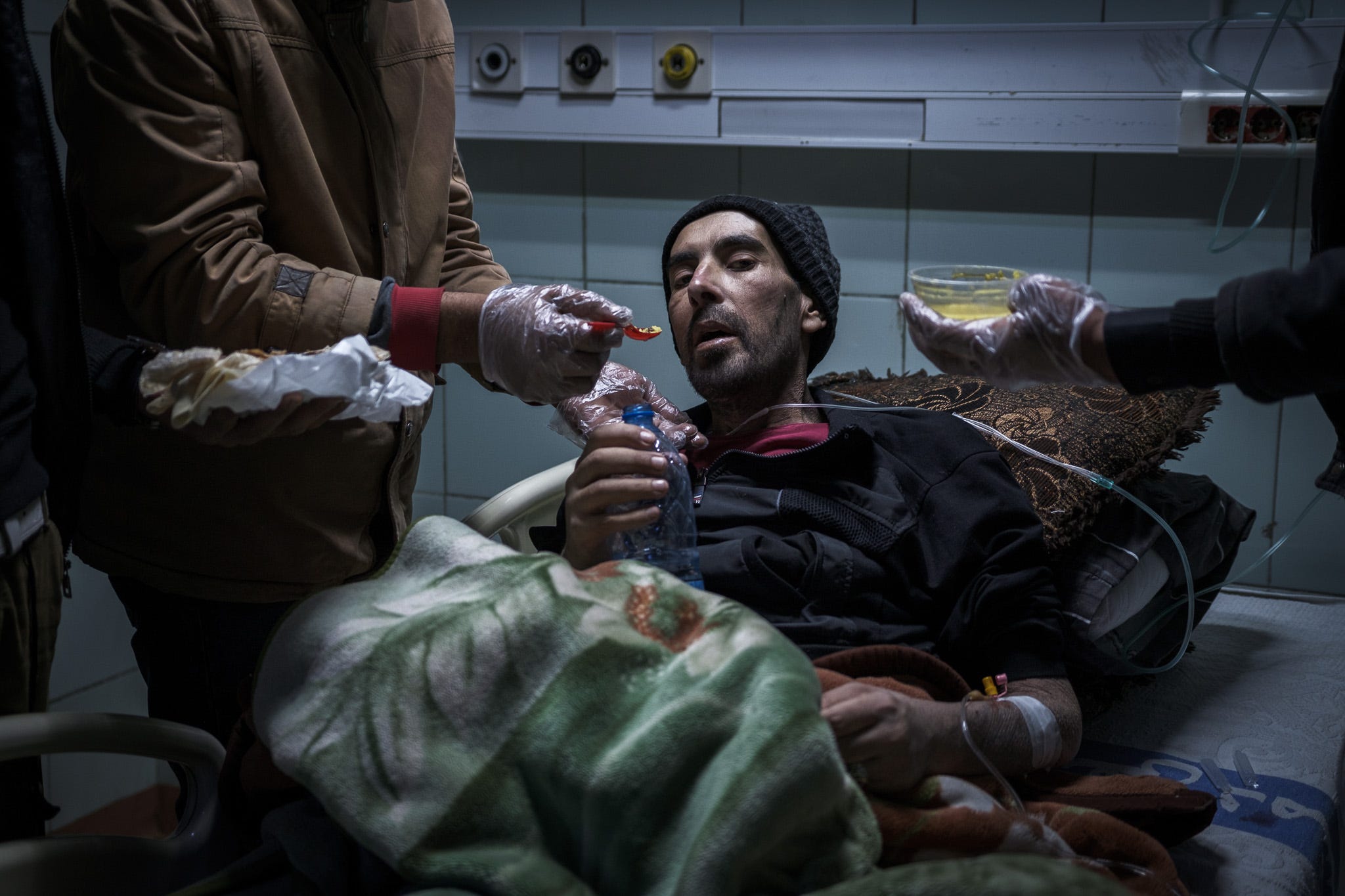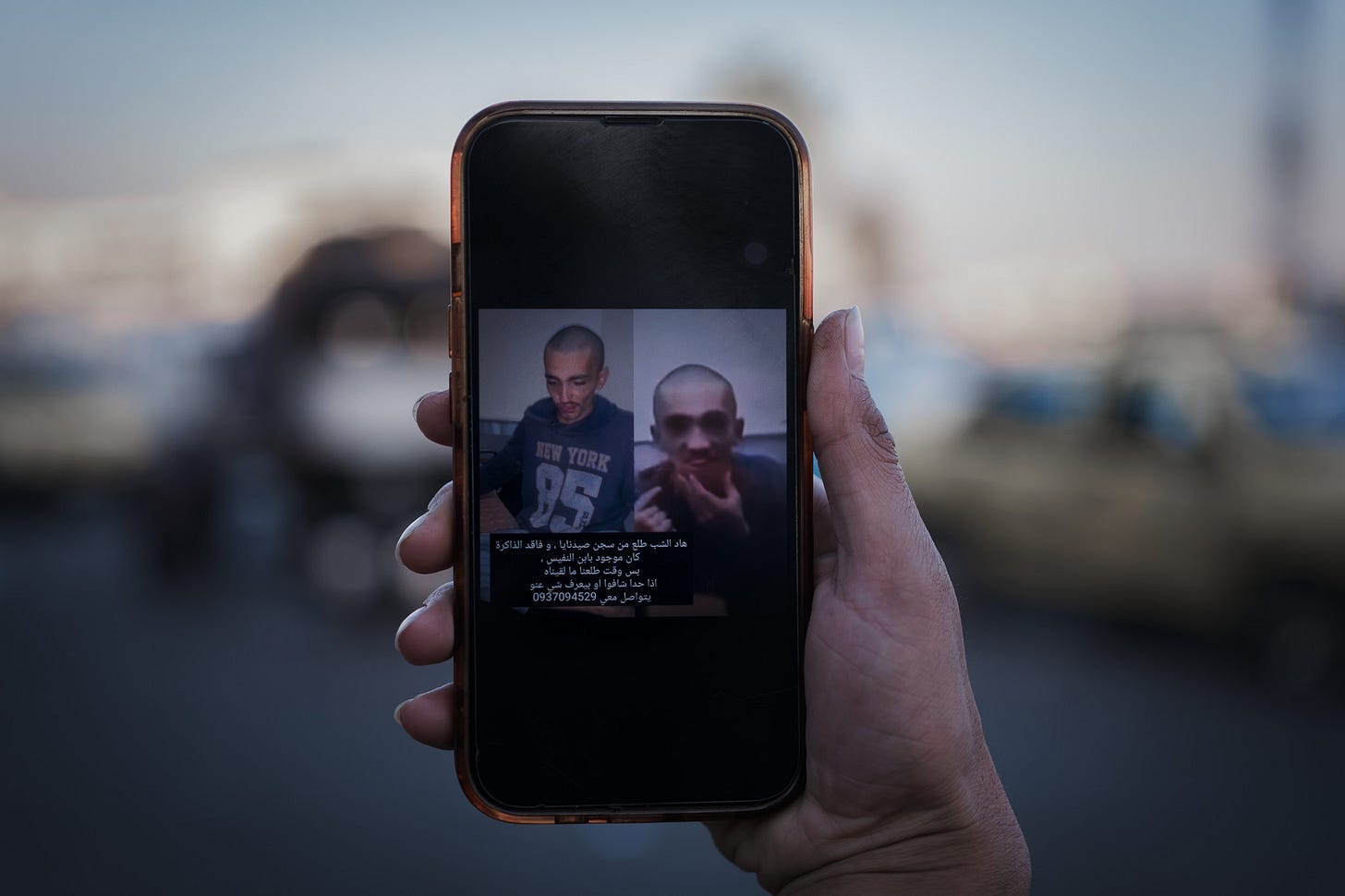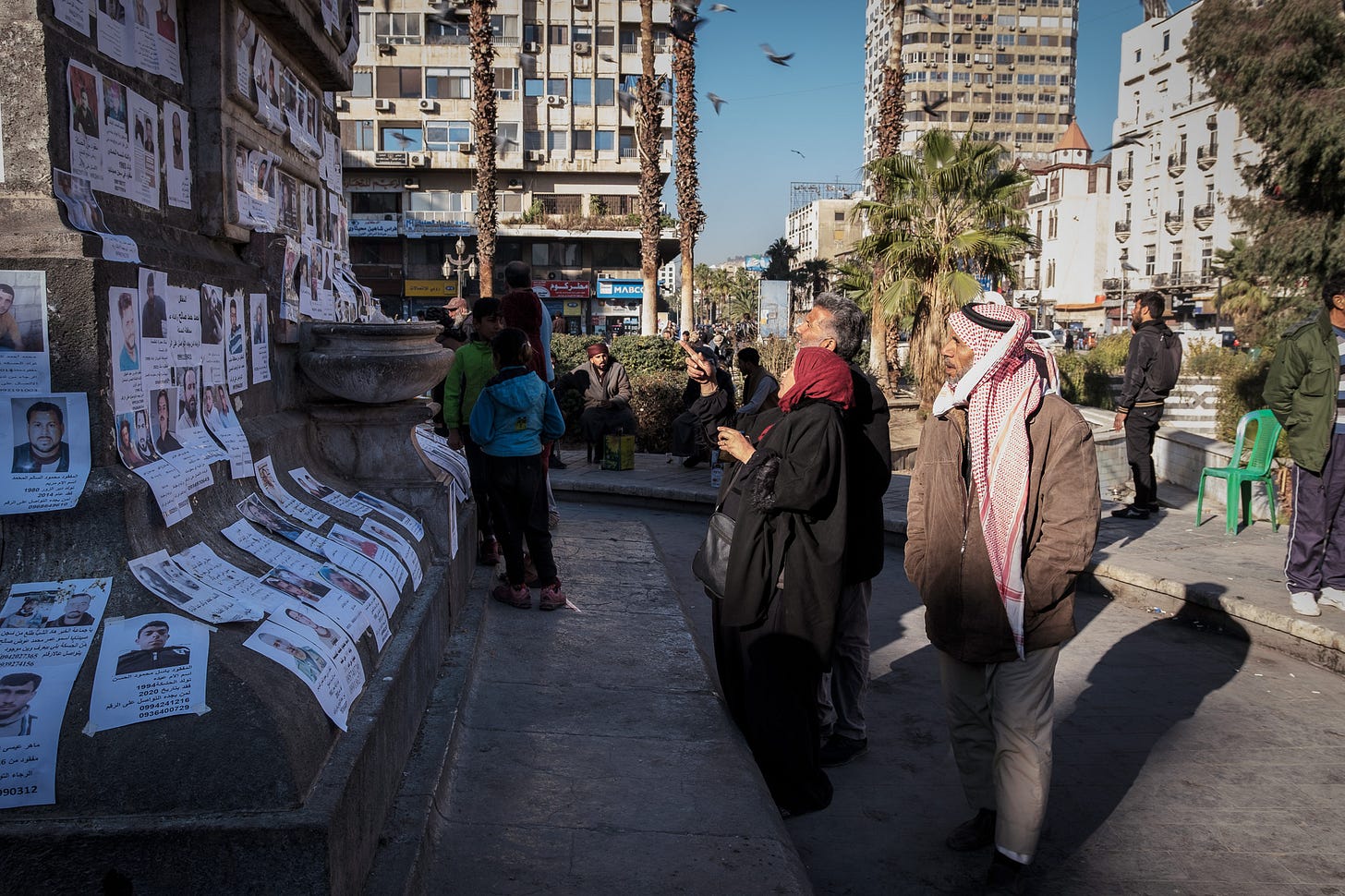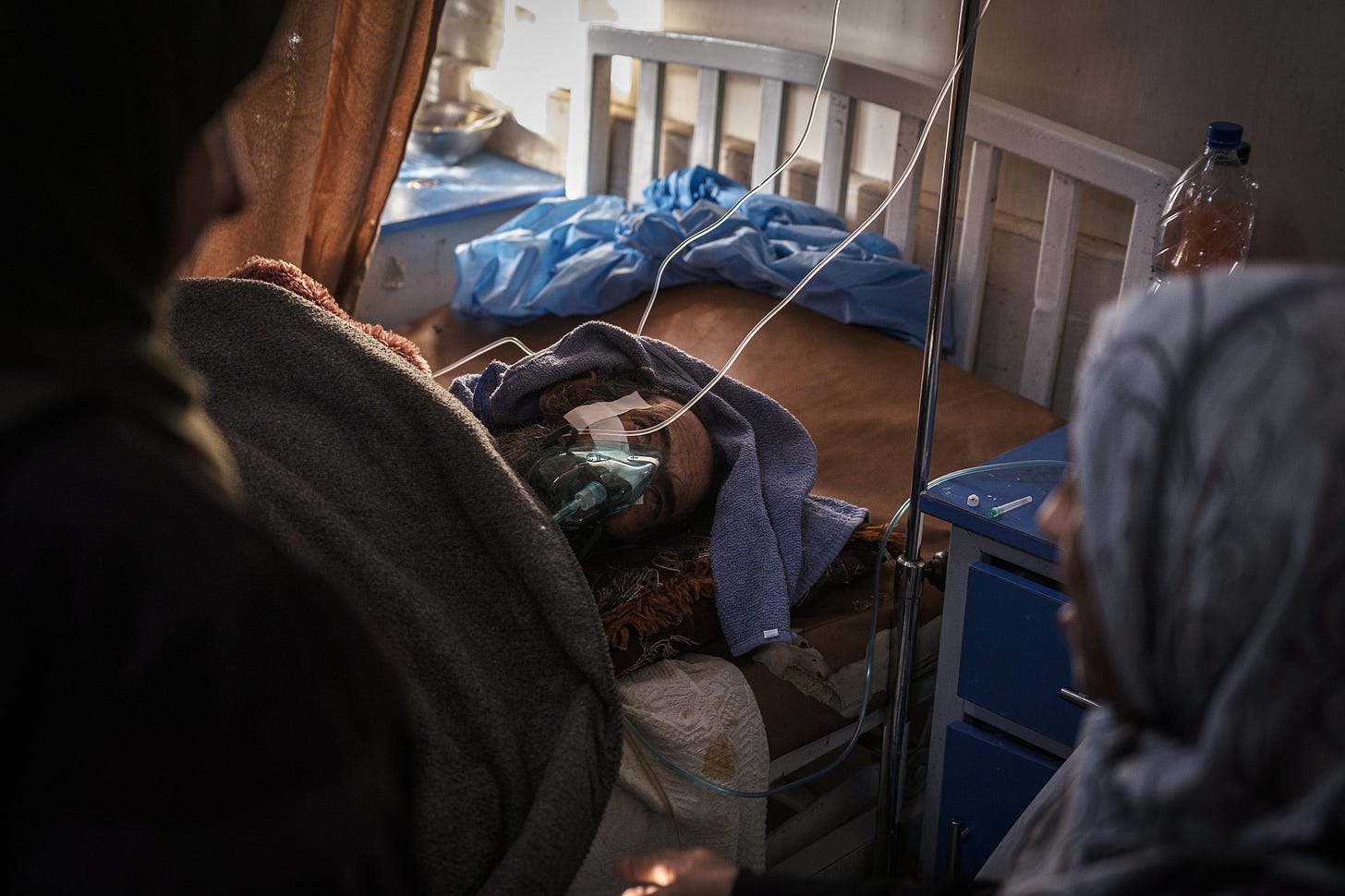The Survivors of Assad's Prisons May Not Live to Tell Their Stories
Years of torture have left them to contend with severe mental illnesses
Damascus, SYRIA—In a dimly lit corner of Mujtahid Hospital’s intensive care unit in central Damascus lay Nour al-Deen Absei, a 40-year-old former inmate of the notorious Saydnaya prison. He had been liberated from the prison on December 8, the day Bashar Al-Assad’s regime fell. After spending more than seven years behind bars undergoing torture, he was struggling to stay alive.
Unconscious for most of the day and unable to speak or comprehend his surroundings, Nour’s cognitive capabilities had been severely degraded through years of systematic physical and psychological torture. Doctors diagnosed him with tuberculosis, a bacterial disease of the lungs with a 70 percent fatality rate if untreated; he had also suffered a head injury, but the hospital’s magnetic resonance imaging test machine was broken, preventing the doctors from properly examining him. (It’s also unclear if his body, in its weakened state, could have endured an intensive examination.) Despite the risk of catching tuberculosis, his family sat beside him, wearing protective gear.
Given the severity of Nour’s head trauma, the family believed the officers in the prison beat him in the head during the regime’s final days. “We found him lying on the ground in very bad shape,” Nour’s brother, Ibraheem Absei, told Drop Site News. ”When we recognized him, we took him to hospital. At first he was going in and out of consciousness and wasn't responsive because he’s suffering from a lot of physical and mental stress. His body is weak. All of the days after [Assad’s] fall he’s been taking a lot of sleep hours. Initially he was in a coma.”

Nour’s story is a testimony of the conditions endured by the more of 135,000 prisoners locked up during Assad’s regime, which used the prison system as a tool to instill fear in the population and crack down on any citizen who dared to challenge the status quo, whether in public or at home. Many of the prisoners who have now been freed, were tortured to the point of dramatically losing their cognitive abilities and even forgetting their identities and sense of self. Medical studies suggest that torture-induced stress can lead to memory loss as a self-defense mechanism to avoid the repetition of painful moments.
“All the prisoners were in a terrible mental state. They were requesting to be in a dark room and to be in a quiet space,” said A.H., a 29-year-old psychiatrist at Mujtahid Hospital. “We did that so they can have mental comfort. All the patients [have some sort] of mental illness. There is a state of psychological dissociation. After torture, a person separates from themselves to escape the pain.”
A.H. said some mentally ill patients have tried to escape from the hospital, believing that the military police would return to haul them back to prison. “They are paranoid of any male figure. [They think] they are working for the regime,” she said. Meanwhile, there are reports of other severely traumatized prisoners roaming the streets of Damascus disoriented.
Decades of oppression and an economic collapse prompted thousands of highly skilled physicians to flee Syria, leaving behind few specialists capable of treating cases like Nour’s. International sanctions and a crippled economy have left Syria’s healthcare system in shambles. The sanctions are also forcing doctors to work with outdated equipment and a lack of medical supplies. “We do not have effective or sufficient medicines [to treat these patients]. There is a shortage of everything. We use university students instead of qualified doctors,” A.H. said.
The walls of hospitals and landmarks across the country, like the old telegraph pole at Marjeh Square in Damascus, are now covered with hundreds of posters featuring pictures and information of the missing who were detained under the Assad regime. Syrians from all corners of the country and many who have recently returned from abroad are desperately hoping to find any leads that could help them reunite with their loved ones. Only the fortunate ones will be able to find them as mass graves with thousands of corpses start emerging across Syria.
Jalylah Shalaby, a 52-year-old mother from Raqqa, has repeatedly traveled to Damascus since her two sons were arrested in 2014. On her visits to the city, she often slept on the streets. “The military came to our house and took them from their beds at night in 2014. I haven’t seen them since,” she said, her face full of tears.
Shemaly, who spoke to Drop Site on condition of anonymity for fear of losing his refugee status in Europe, travelled from Europe to Syria the day of Assad’s ouster to look for his missing brother. He has hired several people across the country to gather any new details on the situation of his relative, with little to no success. “I don’t work with hope, I work with logic because I know that if I am hopeful, I am going to be disappointed. For me, I can’t say whether he’s alive or dead. He’s not on any list. He could’ve been kidnapped and killed.”
Since the Assad regime collapsed, the International Committee of Red Cross (ICRC) has opened several hotlines to help relatives reunite with their loved ones. “In the past 13 years, we have received 35,000 requests from families looking for their loved ones,” Suhair Zakkout, ICRC’s spokesperson for Syria, told Drop Site. “During these last four [initial] weeks [after the fall] we have dealt with 1,000 calls only from within Syria. We also have numbers in Iraq, Lebanon, etc. The global number could be bigger.”
Many of the freed prisoners are scattered in hospitals and mosques throughout the country, with families flocking to these places looking for any information on the whereabouts of their relatives. This is the case at Al Mouwasat Hospital in Damascus, where an unaccompanied prisoner diagnosed with amnesia has been transferred between wards since he was freed at the beginning of December.
Rana, whose real name is not being revealed due to fears of reprisal attacks, said that the patient was left unattended in the emergency room for several days before a family, believing he was their relative, took care of him until they saw his tattoo and realized it wasn’t him.
“I tried to help by posting a picture on multiple pages. Ever since I posted these pictures, a lot of people came to check but nobody has claimed him,” Rana said discreetly in one of the hospital’s staircases. She lost contact with her brother last year as he was fleeing to Europe. She hopes someone is taking care of him, the same way she’s looking after the patient, wherever he might be. “I am always checking on [the patient] every couple of hours. I’ve been doing this for six days. I was surprised to see him at the emergency entrance after three days. He was better, now he’s getting worse.”

Similar scenes are happening playing out across Syria. Brutally tortured prisoners, unable to find their way back home, fight to survive in emergency rooms or on the streets, waiting to be found. “Some will reunite with their families, while others will never return to their normal lives. Some have already met their fates,” Rana said as tears flowed down her face.
One month after the fall of the regime, the new interim government has yet to release a comprehensive strategy to aid former prisoners and their families in their path to recovery. “Most prisoners are either still hospitalized throughout the country or at home with their families,” said Ahmad Abdullah, head of the media department at the Ministry of Health. “However, we still don’t know the exact number of prisoners who are still at hospital, but now most cases [in Damascus] are being transferred to Ibn Rushd Psychiatric Hospital.”
Ahmed Hussein al-Sharaa, better known as Abu Muhammad al-Jolani, the leader of Hayat Tahrir al-Sham, the militant group that kickstarted the offensive, has vowed to pursue those responsible for torturing and killing prisoners. “We won’t forgive who tortured the prisoners and killed them. Anyone responsible will be prosecuted in our country. We ask other countries to deport those criminals who ran away abroad to achieve justice,” he said in the days following the fall of Assad. On December 28, Lebanese security forces deported 70 Syrian officers and soldiers loyal to the regime back to Syria, where former government and high-ranking military officials are awaiting trial.
“There is always hope for the future,” continued Suhair. “The hope comes from upholding International Humanitarian Law. The process of healing will take time but for this to happen, the [torture] policies that have been in place should stop [from different actors] in Syria to bring real hope for the families.”
On December 19, the prisoner with amnesia succumbed to his injuries without ever finding his family. Despite extensive efforts by Rana and hospital staff, he was never identified.
As for Nour, his condition slowly deteriorated. In the early hours of December 21, he passed away in the ICU at Mujtahid Hospital.








Very sad